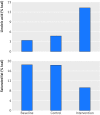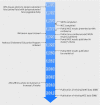Re-evaluation of the traditional diet-heart hypothesis: analysis of recovered data from Minnesota Coronary Experiment (1968-73)
- PMID: 27071971
- PMCID: PMC4836695
- DOI: 10.1136/bmj.i1246
Re-evaluation of the traditional diet-heart hypothesis: analysis of recovered data from Minnesota Coronary Experiment (1968-73)
Erratum in
-
Re-evaluation of the traditional diet-heart hypothesis: analysis of recovered data from Minnesota Coronary Experiment (1968-73).BMJ. 2024 Jun 28;385:q1450. doi: 10.1136/bmj.q1450. BMJ. 2024. PMID: 38942429 Free PMC article. No abstract available.
Abstract
Objective: To examine the traditional diet-heart hypothesis through recovery and analysis of previously unpublished data from the Minnesota Coronary Experiment (MCE) and to put findings in the context of existing diet-heart randomized controlled trials through a systematic review and meta-analysis.
Design: The MCE (1968-73) is a double blind randomized controlled trial designed to test whether replacement of saturated fat with vegetable oil rich in linoleic acid reduces coronary heart disease and death by lowering serum cholesterol. Recovered MCE unpublished documents and raw data were analyzed according to hypotheses prespecified by original investigators. Further, a systematic review and meta-analyses of randomized controlled trials that lowered serum cholesterol by providing vegetable oil rich in linoleic acid in place of saturated fat without confounding by concomitant interventions was conducted.
Setting: One nursing home and six state mental hospitals in Minnesota, United States.
Participants: Unpublished documents with completed analyses for the randomized cohort of 9423 women and men aged 20-97; longitudinal data on serum cholesterol for the 2355 participants exposed to the study diets for a year or more; 149 completed autopsy files.
Interventions: Serum cholesterol lowering diet that replaced saturated fat with linoleic acid (from corn oil and corn oil polyunsaturated margarine). Control diet was high in saturated fat from animal fats, common margarines, and shortenings.
Main outcome measures: Death from all causes; association between changes in serum cholesterol and death; and coronary atherosclerosis and myocardial infarcts detected at autopsy.
Results: The intervention group had significant reduction in serum cholesterol compared with controls (mean change from baseline -13.8%v-1.0%; P<0.001). Kaplan Meier graphs showed no mortality benefit for the intervention group in the full randomized cohort or for any prespecified subgroup. There was a 22% higher risk of death for each 30 mg/dL (0.78 mmol/L) reduction in serum cholesterol in covariate adjusted Cox regression models (hazard ratio 1.22, 95% confidence interval 1.14 to 1.32; P<0.001). There was no evidence of benefit in the intervention group for coronary atherosclerosis or myocardial infarcts. Systematic review identified five randomized controlled trials for inclusion (n=10,808). In meta-analyses, these cholesterol lowering interventions showed no evidence of benefit on mortality from coronary heart disease (1.13, 0.83 to 1.54) or all cause mortality (1.07, 0.90 to 1.27).
Conclusions: Available evidence from randomized controlled trials shows that replacement of saturated fat in the diet with linoleic acid effectively lowers serum cholesterol but does not support the hypothesis that this translates to a lower risk of death from coronary heart disease or all causes. Findings from the Minnesota Coronary Experiment add to growing evidence that incomplete publication has contributed to overestimation of the benefits of replacing saturated fat with vegetable oils rich in linoleic acid.
Published by the BMJ Publishing Group Limited. For permission to use (where not already granted under a licence) please go to http://group.bmj.com/group/rights-licensing/permissions.
Conflict of interest statement
Competing interests: All authors have completed the ICMJE uniform disclosure form at
Figures










Comment in
-
Dietary fats: a new look at old data challenges established wisdom.BMJ. 2016 Apr 12;353:i1512. doi: 10.1136/bmj.i1512. BMJ. 2016. PMID: 27072816 Free PMC article.
-
Diet-heart disease hypothesis is unaffected by results of analysis of recovered data from Minnesota Coronary Experiment.Evid Based Med. 2016 Oct;21(5):185. doi: 10.1136/ebmed-2016-110486. Epub 2016 Aug 24. Evid Based Med. 2016. PMID: 27559090 No abstract available.
References
-
- Sherwin R. Controlled trials of the diet-heart hypothesis: some comments on the experimental unit. Am J Epidemiol 1978;108:92-9.pmid:707483. - PubMed
-
- Executive Committee on Diet and Heart Disease. National Diet-Heart Study Report. American Heart Association, 1968.
-
- Getz GS, Vesselinovitch D, Wissler RW. A dynamic pathology of arteriosclerosis. Am J Med 1969;46:657-73. 10.1016/0002-9343(69)90018-7 pmid:4897055. - DOI - PubMed
-
- Camejo G, Waich S, Quintero G, Berrizbeitia ML, Lalaguna F. The affinity of low density lipoproteins for an arterial macromolecular complex. A study in ischemic heart disease and controls. Atherosclerosis 1976;24:341-54. 10.1016/0021-9150(76)90126-X pmid:184797. - DOI - PubMed
-
- Armstrong ML, Warner ED, Connor WE. Regression of coronary atheromatosis in rhesus monkeys. Circ Res 1970;27:59-67. 10.1161/01.RES.27.1.59 pmid:4987450. - DOI - PubMed
Publication types
MeSH terms
Substances
Grants and funding
LinkOut - more resources
Full Text Sources
Other Literature Sources
Medical
